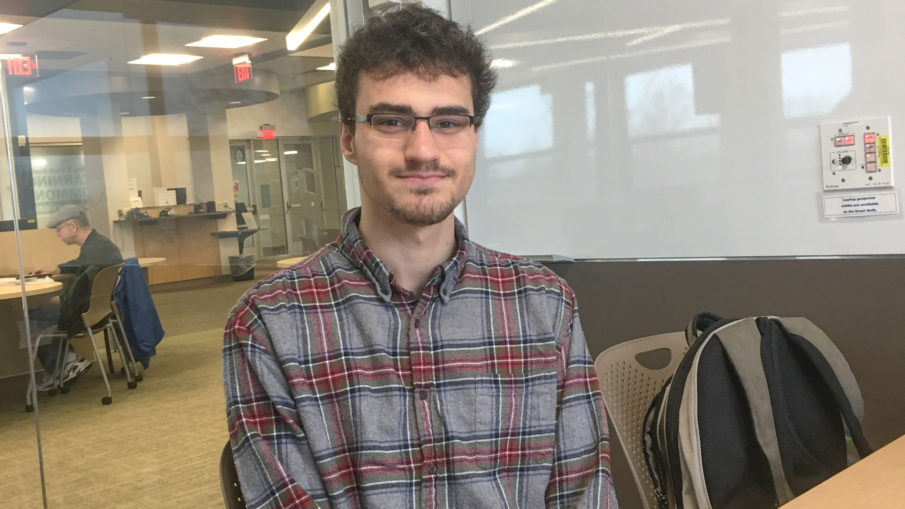Keziah Padden: What is your major and year FCC?
Adam Dertzbaugh: Right now, I’m a sophomore and I don’t have a major, but I am planning to transfer to Shippensburg University in Pennsylvania.
Padden: Tell me a little bit about yourself.
Dertzbaugh: I’m from Pennsylvania, it’s about a 45-minute commute, but this is actually the closest college to where I live. My family lives apart. My mom and brother live together in Virginia and I’m living with my dad in Pennsylvania. My brother also has a lot of learning disabilities, so it’s hard for him and that’s why he’s in Virginia, it’s mostly for his school.
Padden: Why did you choose FCC?
Dertzbaugh: I thought FCC had a bit more variety than my local community college in courses and in general had more resources as well.
Padden: How has FCC helped you as a student? Especially, the Services for Students with Disabilities office:
Dertzbaugh: So, when I came here, I was introduced to Kathleen Porter, who works with disability services. She was very nice. She helped me walk through all the support services they were offering and how to address my concerns with my disability related to classwork. So, I’m very grateful to have that right off the bat and not having to go out of my way to try to search for support services on my own.
Padden: What kind of resources on campus do you find useful? Why?
Dertzbaugh: I think the biggest resource I found helpful is that there’s a newsletter that goes out and specifically about things related to the disability services office. So, they have a club offering, I believe it’s called “Getting Connected” club and that’s excellent. I have not seen that at other colleges I’ve been to, where they have a club solely focus on supporting people with disabilities.
Padden: How has your disability impact your life as a student?
Dertzbaugh: I originally started my college career going to a four-year school called Allegheny College, which is a small liberal arts school. While there, I developed major depressive disorder and after a semester there I was not able to stay there due to my illness. So, I left school and I got support outside of college. Originally, I had planned on returning, but since then I have decided not to go back because I don’t think that the four-year school is right for a person with my disability.
And also, I suffer from postural orthostatic tachycardia syndrome, which is a movement related disorder which basically causes blood to pool in my outer limbs and makes me incredibly tired after standing up or sitting down for too long. So, for me, I commute to school and it can be very hard sometimes to go to multiple classes, so having the community college where I can kind of spread out my credit hours been helpful.
Padden: Do you have any issues on campus: in classrooms, socializing, getting to certain buildings and why?
Dertzbaugh: I don’t, thankfully, have that much of a difficulty with that. I am working on treating my disability which basically involves a lot of different lifestyle changes and exercise. So, thankfully I’m a bit further along than I think some other people might with more restrictive physical disabilities such as being wheelchair-bound, but I can say it’s been fairly easy for me to navigate the campus it’s very small and compact, so I have really benefited from that.
Padden: Anything you’d like to change on campus to make it more accessible to everyone?
Dertzbaugh: I’m not sure if this exists or not because I have not seen it, but I have not seen a lot of wheelchair access. So, I think that would probably benefit a lot and also some more automatic doors.
Padden: Is there anything you’d like to add that I didn’t ask?
Dertzbaugh: I would say before coming here I really struggled with handling my own disability plan. I cannot remember what exactly they call it here, but you work on developing it with a disability counselor and then give it to your teacher. So, the accommodation process has been pretty welcoming to me because it’s personalized every semester. So, for specific classes and having that level of surety about what services I’m going to get and need per classes has been very helpful. Also, in general, professors have been very accommodating and excepting of my needs and my accommodations and that has been very welcoming as well.

